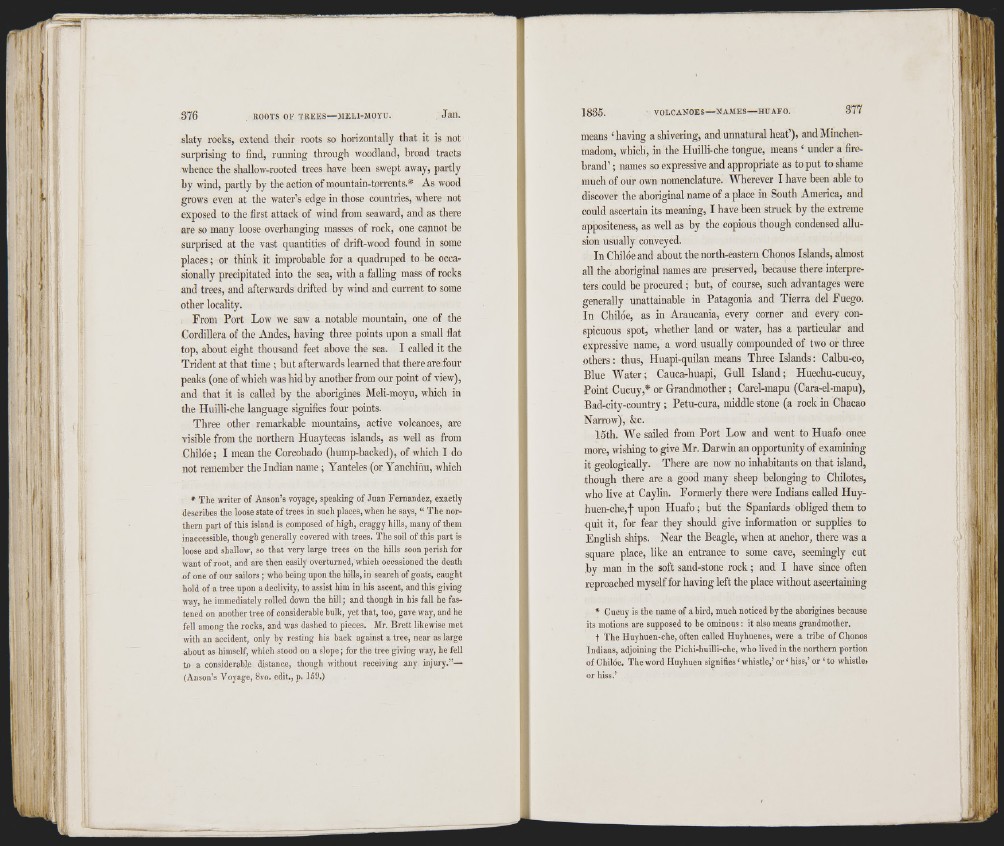
i V
■I
slaty rocks, extend their roots so horizontally that it is not
surprising to find, running through woodland, broad tracts
whence the shallow-rooted trees have been swept away, partly
by wind, partly by the action of mountain-torrents.* As wood
grows even at the water’s edge in those countries, where not
exposed to the first attack of wind from seaward, and as there
are so many loose overhanging masses of rock, one cannot be
surprised at the vast quantities of drift-wood found in some
places ; or think it improbable for a quadruped to be occasionally
precipitated into the sea, with a falling mass of rocks
and trees, and afterwards drifted by wind and current to some
other locality.
From Port Low we saw a notable mountain, one of the
Cordillera of the Andes, having three points upon a small flat
top, about eight thousand feet above the sea. I called it the
Trident at that time ; but afterwards learned that there are four
peaks (one of which was hid by another from our point of view),
and that it is called by the aborigines Meli-moyu, which in
the Huilli-che language signifies four points.
Three other remarkable mountains, active volcanoes, are
visible from the northern Huaytecas islands, as well as from
Childe ; I mean the Corcobado (hump-backed), of which I do
not remember the Indian name ; Yánteles (or Yancbiñu, which
* The writer of Anson’s voyage, speaking of Juan Fernandez, exactly
describes the loose state of trees in such places, when he says, “ The northern
part of this island is composed of high, craggy hills, many of them
inaccessible, though generally covered with trees. The soil of this part is
loose and shallow, so that very large trees on the hills soon perish for
want of root, and are then easily overturned, which occasioned the death
of one of our sailors ; who being upon the hills, in search of goats, caught
hold of a tree upon a declivity, to assist him in his ascent, and this giving
way, he immediately rolled down the hill ; and though in his fall he fastened
on another tree of considerable bulk, yet that, too, gave way, and he
fell among the rocks, and was dashed to pieces. Mr. Brett likewise met
with an accident, only by resting his back against a tree, near as large
about as himself, which stood on a slope ; for the tree giving way, he fell
to a considerable distance, though without receiving any injury.”—
(Anson’s Voyage, 8vo. edit., p. 159.)
means ‘ having a shivering, and unnatural heat’), and Minchen-
madom, which, in the Huilli-che tongue, means ‘ under a firebrand’
; names so expressive and appropriate as to put to shame
much of our own nomenclature. Wherever I have been able to
discover the aboriginal name of a place in South America, and
could ascertain its meaning, I have been struck by the extreme
appositeness, as well as by the copious though condensed allusion
usually conveyed.
In Chilóe and about the north-eastern Chonos Islands, almost
all the aboriginal names are preserved, because there interpreters
could be procured ; but, of course, such advantages were
generally unattainable in Patagonia and Tierra del Luego.
In Chiloe, as in Araucania, every corner and every conspicuous
spot, whether land or water, has a particular and
expressive name, a word usually compounded of two or three
others: thus, Huapi-quilan means Three Islands: Calbu-co,
Blue Water; Cauca-huapi, Gull Island; Huechu-cucuy,
Point Cucuy,* or Grandmother ; Carel-mapu (Cara-el-mapu),
Bad-city-country ; Petu-cura, middle stone (a rock in Chacao
Narrow), &c.
15th. We sailed from Port Low and went to Huafo once
more, wishing to give Mr. Darwin an opportunity of examining
it geologically. There are now no inhabitants on that island,
though there are a good many sheep belonging to Chilotes,
who live at Caylin. Formerly there were Indians called Huy-
huen-che,f upon Huafo ; but the Spaniards obliged them to
quit it, for fear they should give information or supplies to
English ships. Near the Beagle, when at anchor, there was a
square place, like an entrance to some cave, seemingly cut
by man in the soft sand-stone rock; and I have since often
reproached myself for having left the place without ascertaining
* Cucuv is the name of a bird, much noticed by the aborigines because
its motions are supposed to be ominous: it also means grandmother.
t The Huyhuen-che, often called Huyhuenes, were a tribe of Chonos
Indians, adjoining the Pichi-huilli-che, who lived in the northern portion
of Chiloe. The word Huyhuen signifies < whistle,’ or ‘ hiss,’ or ‘ to whistle»
or hiss.’